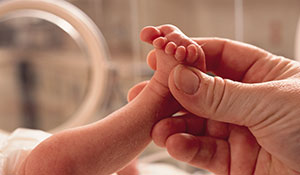
When specialized support is needed, our NICU is ready to care for Houston’s tiniest and sickest babies.
The Woman’s Hospital of Texas is committed to the health and well-being of all babies and moms, especially those facing challenges that require NICU care. With 146 beds, our NICU provides observation and specialized care for premature and high-risk infants. Our Level IV NICU allows us to offer the highest level of care available for newborns who are premature, critically-ill, or have a life threatening health condition.
Our NICU Units were truly designed with families in mind. Whether your baby needs short or long term care our 18,000 square foot unit is there to support all of your needs. Our facility houses the medical technology needed to care for premature and critically ill babies, including respiratory support, specialized MRI imaging, and total body cooling. In addition, our NICU includes physician sleep rooms, lactation rooms, a milk bank, and two transition rooms that will allow parents to spend the night with their baby before being discharged home.
A team of highly specialized and experienced staff cares for babies, including an in-house, board-certified Neonatologist (physician specializing in the care of newborns) and Neonatal Nurse Practitioners who are on site at all times and available 24/7 to care for your baby. For babies not born at The Woman's Hospital of Texas in need of our NICU care, our neonatal/NICU transport team is also available 24/7 to provide care while they are being transported to the hospital.
Our NICU Levels of Care
We are among a select number of hospitals in Texas that provide the highest level of care available for high-risk newborns. You will find two levels of care within the NICU: the advanced NICU for the sickest babies and the intermediate NICU for less intense care.
Level 2 NICU - Specialty and Intermediate Care
Our special care nursery cares for babies who are born close to or before their due date, those who are moderately ill and expected to quickly recover, and those who have medical conditions requiring less-intensive monitoring.
Our 82 beds include radiant warmers, incubators, and open cribs. Heart and respiratory rate, blood pressure, and temperature are monitored less frequently, and nutrition may be given by I.V., tube feeding, bottle-feeding, or breastfeeding. Babies may go home from this nursery or may be transferred to our newborn nursery if their mother is still hospitalized.
Level 4 NICU - Subspecialty and Advanced Care
Newborn infants with extreme prematurity, critical illness or who require surgical intervention are often admitted to the advanced nursery where they can receive the highest level of perinatal care. Here, their heart and respiratory rate, blood pressure, temperature, and oxygen levels are continuously monitored by machines.
We have 64 flat, open beds with a warmer overhead, or incubators that provide heat to keep them warm. If breathing support is needed, they will be connected to a ventilator or receive oxygen via other methods. Babies can also be fed with pumped breast milk or special formula through a feeding tube.
For certain neonatal patients with severe conditions such as respiratory failure or lung disease, we offer Extracorporeal Membrane Oxygenation (ECMO). This advanced, potentially lifesaving treatment does the work of the heart and lungs, providing an opportunity for the organs to heal. For additional information on NICU ECMO, please call Emily Christiansen, ECMO Coordinator, at (713) 790-8236.
In addition to meeting all Level III capabilities, our Level IV NICU can:
- Care for infants born earlier than 32 weeks gestation and weighing less than 1,500 grams
- Provide life support
- Perform advanced imaging, including MRI and echocardiography
- Provide a full range of respiratory support
Babies are transferred to the intermediate NICU when their condition improves, and they no longer need intensive monitoring.
Our NICU Support Services
We offer the experienced care and advanced technology your baby needs, as well as the emotional support and education you need to care for your infant.
We provide 24/7 emergency transport care for premature or sick babies who need our NICU services. Our neonatal/NICU transport team has specialized skills and equipment to care for newborns while they are being transported to the hospital. We travel with a neonatal-nurse practitioner, a neonatal-transport nurse, and a respiratory therapist. From small towns located nearby to communities a few hundred miles away, our helicopter travels within a 150-miles within the radius of The Woman's Hospital of Texas, our airplane within 250-miles, and our ambulance within or beyond the limitations of our aircraft.
This program was developed to meet the special needs of families that have been identified as high-risk either because of a mom issue or fetal issue to coordinate specialist appointments and provide support for high risk conditions. Patients are cared for by our comprehensive multidisciplinary team committed to achieving the best possible outcome for them and their babies.
We care for more multiple births than any other hospital in the region. Multiple-gestation pregnancies are often considered high-risk and multiples often encounter challenges like prematurity and low birth weight. Because of this, they sometimes require care in a neonatal intensive care unit (NICU).
The Woman’s Hospital of Texas proudly partners with the March of Dimes to provide the NICU Family Support program. We are the only hospital in Houston that has two full-time March of Dimes NICU family support program coordinators on site. The program offers information and comfort to families during the NICU hospitalization of their newborn, during the transition home, and in the event of a newborn death. It also provides professional education for NICU staff; and promotes neonatal family centered care in NICUs.
For women experiencing high risk pregnancies who require bed rest, our 48-bed Antepartum Unit (APU) provides mothers them with the additional support they and their vulnerable babies require before delivery. Perinatologists (physician specialists in maternal and fetal medicine) and antepartum nurses manage these high-risk pregnancies toward optimal outcome.